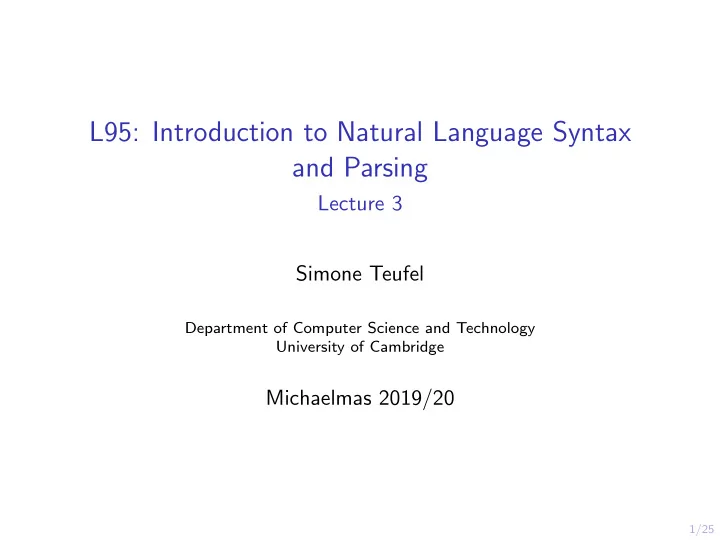

L95: Introduction to Natural Language Syntax and Parsing Lecture 3 Simone Teufel Department of Computer Science and Technology University of Cambridge Michaelmas 2019/20 1/25
Organisational • Read Section 5.1 to 5.6 • Do Exercises 1-3 in section 5.9 • Familiarise yourselves with PTB Guidelines • Submit Assignment 1 (POS-tagging) on Monday 12noon • Work through logic worksheet • Today: Assignment 2 (Phrase structure analysis of NPs) 2/25
About Aassignment 1/Recap • Tokenization • Ambiguity • Idioms • Multi Word Units • Finite vs. non-finite forms of the verb • Use vs Mention: quoted material, titles, . . . • Discuss cases of uncertainty 3/25
Particles vs. Prepositions • The man up the ladder fell. • Kim ran up the stairs. • Kim ran up a large bill. • Kim slipped up. • Kim washed up the dishes. • Kim washes the dishes up. 4/25
Lexical Features Feature Values Examples Num(ber) Sg / Pl boy(+s) N-type Mass,Count, Name boy, research *research+s, Fred Per(son) 1,2,3 I (1sg), you (2sg) (s)he (3sg) Case Nom, Acc he (nom), him (acc) Valence Intrans, Trans, Ditrans, Scomp,. . . smile, kiss, give, believe. . . A-type base / comparative / superlative – old, older, oldest 5/25
6/25
Eh? From the film “The Martian”. (An instance of productive derivational morphology (zero-derivation).) 7/25
Moving on... • Constituency • Phrase structure Grammar • Phrase structure Trees • Tests for Constituency 8/25
Linguistic Methodology • Descriptive, not prescriptive • Example: should we (or should we not) split infinitives? • Captain Kirk (boldly) has (boldly) gone beyond our galaxy • Captain Kirk’s mission is (boldly) to (boldly) go beyond our galaxy • Captain Kirk (boldly) has (boldly) been (boldly) travelling (*boldly) the universe for 30 years • Which rule can we derive from this? 9/25
Linguistic Methodology • Descriptive, not prescriptive • Example: should we (or should we not) split infinitives? • Captain Kirk (boldly) has (boldly) gone beyond our galaxy • Captain Kirk’s mission is (boldly) to (boldly) go beyond our galaxy • Captain Kirk (boldly) has (boldly) been (boldly) travelling (*boldly) the universe for 30 years • Which rule can we derive from this? 10/25
Distributional analysis • Algorithm: • Create a template • Perform substitutions • Test for grammaticality • Ungrammaticality, semantic oddness/implausibility • The can run can run • • collect an equivalence class of strings that can go in the slot. • They are called Constituents • This is an entirely bottom-up approach championed in the 1930s • Today, two different dominant approaches: • Generative grammar (phrase structure) • Headedness (relational) 11/25
Generative Methodology • Noam Chomsky (1957): Syntactic Structures • Finite sets of rules predict all and only grammatical sentences • Generative grammars: mappings between sentences and meaning 12/25
A context-free grammar Lexicon: V -> can Rules: V -> fish S -> NP VP NP -> fish VP -> VP PP NP -> they VP -> V NP -> rivers VP -> V NP NP -> pools VP -> V VP NP -> December NP -> NP PP NP -> Scotland PP -> P NP NP -> it P -> in 13/25
Headedness • The heads of NPs are nouns. • Heads are the only constituent of a constituent that cannot be dropped: • The castle is old • *The is old • The big castle is old • *The big is old • The castle by the hill is old • *The by the hill is old • Castles are interesting 14/25
Phrase Marker Trees 15/25
Constituency Tests Substitution test • use “proform” (eg “do so” stands in for a VP; eg. “that” stands in for an NP) • If substitution is felicitious, then phrase is a constituent (of same category as the proform). • What are other NPs (like “the people”)? • What are other transitive verbs (like “love”)? 16/25
Constituency Tests Movement test • Constituents can be moved around in the sentence. • The old man has come to dinner. • Has the old man come to dinner? • *The has old man come to dinner 17/25
Constituency Tests Insertion test • Appositions are parentheticals. • They cannot be inserted into constituents, only at the end of constituents. • The President of America, Ronald Reagan, is over 70. • *The President, Ronald Reagan, of America is over 70. • *The President of America is, Ronald Reagan, over 70. 18/25
Constituency Tests Omissibility test (only suitable for some constituent types) • Some constituents can be omitted • Non-constituents cannot be omitted • Some friends of the old man came to dinner. • Some friends came to dinner. • *Some friends man came to dinner. 19/25
Constituency Tests Coordination test (well-known exceptions) • Constituents of the same type can be coordinated • Kim and Sandy kissed each other • The old men and women came to dinner • The old man and his young nephew came to dinner • Kim and Sandy divorced and remarried each other • Kim kissed Sandy and remarried her • That rather old and very unreliable car belongs to Kim • Kim washed up and Sandy watched the TV 20/25
Problems for Coordination Test • Kim is a conservative and proud of it • Kim became a conservative and arrogant • Kim enjoys chess and watching football • Kim gave Sandy a pen and Fido a bone • “To hell with them and be dammed”, he said. 21/25
Assignment 2 • Perform a phrase structure analysis of all noun phrases in your chosen sentences (the same ones from assignment 1) • First bracket all NPs • Recursively embedded • Draw a Phrase Structure tree for each NP • Reuse your Tokenisation and POS analysis from assignment 1 • Submit by Monday 28 October 22/25
23/25
Noun compounds 24/25
Reading for next time • Read 5.7 and 5.8 • We will discuss exercises in 5.9 (1-3), so if you haven’t done them, another chance. • Keep working on logic worksheet 25/25
Recommend
More recommend